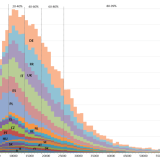
Jól működő és befogadó munkaerőpiacok
A pénzügyi és gazdasági válság nyilvánvalóvá tette, hogy a jól működő munkaerőpiacok a gazdaságban rejlő munkahelyteremtési lehetőségek teljes mértékű kihasználásának előfeltételei. A válság ‒ amely különösen súlyosan érintett bizonyos csoportokat, például a fiatalokat és a kevésbé iskolázottakat ‒ igen eltérő munkaerőpiaci következményeket idézett elő az egyes uniós tagállamokban. A folyamatos gyors strukturális változás is új kihívásokat jelent több ágazatban és régióban, ami a lehetséges munkaerőhiányt és a strukturális munkaerőhiányt illeti.
Az EU számára az Európai Szociális Alap a legfőbb eszköz a foglalkoztatás és a társadalmi befogadás előmozdításához, ezáltal elősegítve az emberek munkához jutását, a hátrányos helyzetűek társadalmi integrációját és kedvezőbb életlehetőségek biztosítását mindenki számára. Ezenkívül a munkavállalók munkaerőpiaci jogairól számos európai jogszabály rendelkezik. Ezen túlmenően 2017. áprilisban az Európai Bizottság előterjesztette a szociális jogok európai pillérét. A pillér az uniós szociál- és foglalkoztatáspolitikára épül és azt egészíti ki annak érdekében, hogy számos, a jól működő és méltányos munkaerőpiacok és jóléti rendszerek szempontjából alapvető jelentőségű területen szakpolitikai iránymutatást nyújtson.
- Európai Bizottság: Európai Szociális Alap
- Európai Bizottság: A szociális jogok európai pillére





















